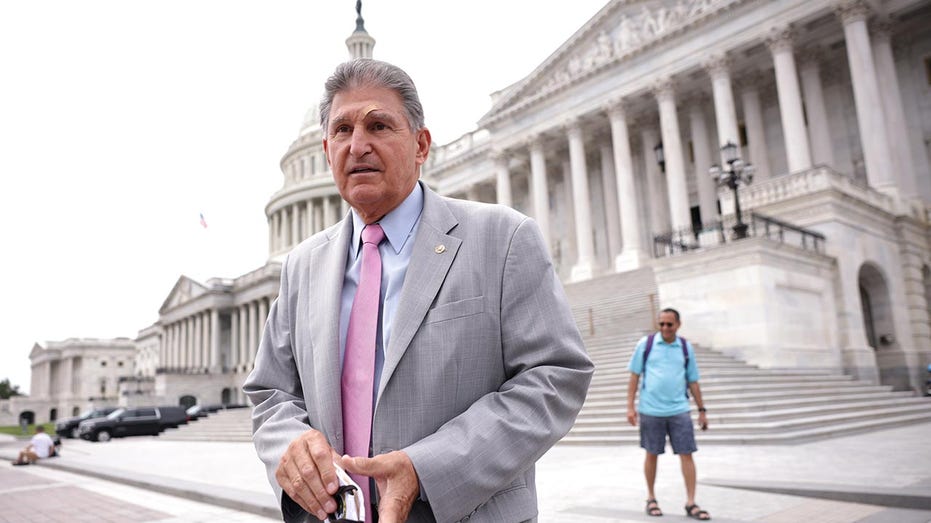What tax hikes are in the Manchin-Schumer reconciliation bill?
Democrats' new reconciliation bill would amount to one of the largest tax hikes in years
What is really in the reconciliation bill?
Strategas partner and director of research Dan Clifton calls out the Democrats' tax and spending spree on 'Kudlow.'
Senate Majority Leader Chuck Schumer, D-N.Y., and Sen. Joe Manchin, D-W.Va., unveiled the outline of a new tax, climate and health care proposal on Wednesday, a stunning reversal that marks a major breakthrough for President Biden's long-stalled economic agenda.
The reconciliation bill — repackaged by Democrats as the Inflation Reduction Act of 2022 — would raise an estimated $739 billion over the next decade, with the revenues going toward initiatives designed to combat climate change and curb pharmaceutical prices, as well as efforts to reduce the nation's $30 trillion debt.
It includes about $433 billion in new spending, while roughly $300 billion of the new revenue raised would go toward paying down the nation's deficit — a priority for Manchin.
"This is the action the American people have been waiting for. This addresses the problems of today — high health care costs and overall inflation — as well as investments in our energy security for the future," Biden said in a statement.
US ECONOMY ENTERS TECHNICAL RECESSION AFTER GROWTH TUMBLES 0.9% IN THE SECOND QUARTER
While the bill's future remains uncertain in the 50-50 Senate, if passed it would amount to one of the largest tax hikes in decades. Still, it's a far cry from the ambitious $3 trillion agenda that Biden rolled out last year that relied on major tax increases on wealthy Americans and corporations — and that Manchin subsequently killed.

Sen. Joe Manchin, D-W.Va., leaves the U.S. Capitol in Washington following a vote on Aug. 3, 2021. (Photo by Kevin Dietsch/Getty Images / Getty Images)
Here is a closer look at the tax increases and other items included in the latest legislation:
Corporate minimum tax: $313 billion
The legislation would impose a 15% minimum tax on the book income of corporations. The tax would hit the profit that corporations publicly report on their financial statements to shareholders.
Democrats said the levy would affect around 200 of the country's largest corporations — with profits exceeding $1 billion — that pay less than the current 21% rate for businesses.
"Tax fairness is vital to our nation’s economic future," Manchin said in a statement. "It is wrong that some of America’s largest companies pay nothing in taxes while freely enjoying the benefits of our nation’s military security, infrastructure and rule of law."
Prescription drug pricing reforms: $288 billion
Under the bill, the government would have the power to negotiate with drugmakers in order to lower prices for certain prescription drugs. The proposal would cap what seniors on Medicare pay out of pocket for drugs each year at $2,000.
IS THE UNITED STATES ENTERING A RECESSION?
If pharmaceutical companies raise the prices of their drugs more than the rate of inflation, pharmaceutical companies would be required to rebate Medicare.
IRS enforcement: $124 billion
The Internal Revenue Service would receive $80 billion in order to enhance tax enforcement by hiring more agents and introducing new technology to pursue tax dodgers.
Democrats expect a beefed-up IRS to add an extra $124 billion in revenue by cracking down on tax evasion by wealthy individuals and corporations.

Senate Majority Leader Chuck Schumer, D-N.Y., speaks to the media after a Democratic policy luncheon on Capitol Hill in Washington on Tuesday, Oct. 19, 2021. ((AP Photo/Jacquelyn Martin) / AP Newsroom)
About $1 trillion in federal taxes may be going unpaid each year because of errors, fraud and a lack of resources to adequately enforce collections, IRS Commissioner Chuck Rettig said last year.
Audit rates have steadily declined over the last year, falling to the lowest level in at least four decades amid dwindling funding and enforcement staff (the IRS has 20,000 fewer staff than it did in 2010). The agency audited just 0.45% of personal income tax returns in 2019, down from 1.1% in 2010, Rettig said in January.
Carried interest loophole: $14 billion
The plan from Manchin and Schumer would repeal the break for carried interest, which allows private equity fund managers to pay lower taxes on their earnings than they would for regular income. The loophole allowed for part of an investment manager's income to be taxed as a capital gain — a 23.8% levy — rather than regular income.
CLICK HERE TO READ MORE ON FOX BUSINESS





















